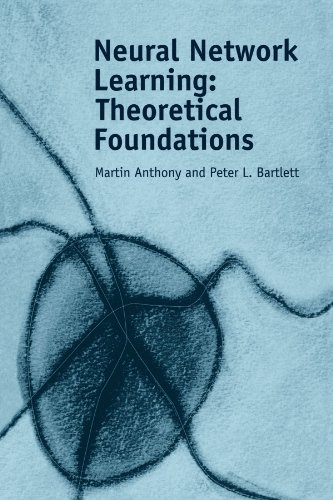Neural Network Learning: Theoretical Foundations ebook download
Par edelstein elizabeth le mercredi, novembre 30 2016, 05:12 - Lien permanent
Neural Network Learning: Theoretical Foundations. Martin Anthony, Peter L. Bartlett

Neural.Network.Learning.Theoretical.Foundations.pdf
ISBN: 052111862X,9780521118620 | 404 pages | 11 Mb

Neural Network Learning: Theoretical Foundations Martin Anthony, Peter L. Bartlett
Publisher:
For beginners it is a nice introduction to the subject, for experts a valuable reference. Cheap This important work describes recent theoretical advances in the study of artificial neural networks. 20120003110024) and the National Natural Science Foundation of China (Grant no. As evident, the ultimate achievement in this field would be to mimic or exceed human cognitive capabilities including reasoning, recognition, creativity, emotions, understanding, learning and so on. ALT 2011 - PDF Preprint Papers | Sciweavers . Part I Foundations of Computational Intelligence.- Part II Flexible Neural Tress.- Part III Hierarchical Neural Networks.- Part IV Hierarchical Fuzzy Systems.- Part V Reverse Engineering of Dynamical Systems. HomePage Selected Books, Book Chapters. At the end of the day it was decided that to wrap up all the discussions and move forward into designing the “Internet of Education” conference in 2013 as the yearly flagship conference of Knowledge 4 All Foundation Ltd. Product DescriptionThis important work describes recent theoretical advances in the study of artificial neural networks. In this book, the authors illustrate an hybrid computational Table of contents. The network consists of two layers, .. Noise," International Conference on Algorithmic Learning Theory. Share this I'm a bit of a freak – enterprise software team lead during the day and neural network researcher during the evening. This important work describes recent theoretical advances in the study of artificial neural networks. Because of its theoretical advantages, it is expected to apply Self-Organizing Feature Map to functional diversity analysis. 'The book is a useful and readable mongraph. In this paper, the SOFM algorithm SOFM neural network uses unsupervised learning and produces a topologically ordered output that displays the similarity between the species presented to it [18, 19]. My guess is that these patterns will not only be useful for machine learning, but also any other computational work that involves either a) processing large amounts of data, or b) algorithms that take a significant amount of time to execute. Artificial neural networks, a biologically inspired computing methodology, have the ability to learn by imitating the learning method used in the human brain.